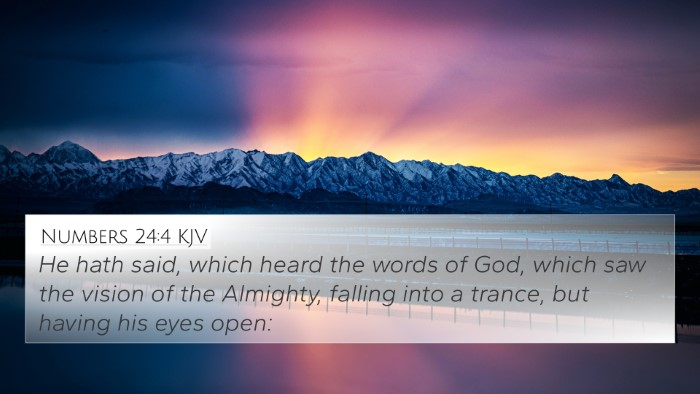Understanding Acts 10:10
Acts 10:10 states: "And he became very hungry, and would have eaten; but while they made ready, he fell into a trance." This verse is pivotal in the unfolding narrative of Peter’s encounter with Cornelius and signifies a turning point in early Christianity.
Summary of Meaning
This verse describes the moment when the Apostle Peter experiences a profound vision that plays a crucial role in the expansion of the Gospel to the Gentiles. Here we see Peter, driven by hunger, fall into a trance—a state in which God communicates profound truths.
Commentary Insights
- Matthew Henry: Henry reflects on the significance of Peter’s trance as a method by which God prepared him for a radical departure from traditional Jewish customs regarding clean and unclean foods. The trance illustrates the divine act of revealing new truths to the Apostles, paving the way for the inclusion of Gentiles into the faith.
- Albert Barnes: Barnes emphasizes Peter's hunger as symbolizing the desire for spiritual nourishment, linking physical feelings to spiritual revelations. The trance serves as a divine preparation for Peter to overcome his prejudices and accept God's universal plan for salvation.
- Adam Clarke: Clarke notes the importance of the trances in the New Testament, drawing parallels with other scriptural instances of divine revelations. He suggests that Peter's vision expresses God’s intent to eliminate divisions and emphasize the unity of believers, regardless of cultural or ethnic backgrounds.
Thematic Connections
This passage has diverse thematic implications relating to divine revelation, inclusivity, and the breaking down of barriers. It foreshadows the major themes of Gentile acceptance in the later chapters.
Cross-References
Acts 10:10 connects beautifully with several Bible verses, emphasizing the themes of revelation and the expanding mission of the Church:
- Acts 11:9: Highlights God’s instruction to Peter that what He has cleansed should not be called uncommon.
- Matthew 15:11: Jesus teaches about what defiles a person coming not from without but from within.
- Romans 1:16: Paul expresses the Gospel's power for salvation to everyone who believes, first for the Jew, then for the Gentile.
- Galatians 3:28: Paul articulates there is neither Jew nor Gentile, male nor female, for all are one in Christ.
- John 10:16: Jesus speaks about other sheep, indicating inclusion beyond Israel.
- Revelation 7:9: A vision of a great multitude from every nation, tribe, people, and language standing before the throne.
- Isaiah 49:6: The prophecy emphasizes God's plan for His servant to be a light for the Gentiles.
Inter-Biblical Dialogue
Acts 10:10 engages in an inter-Biblical dialogue showcasing how the New Testament interprets and fulfills Old Testament prophecies. This engagement encourages comparative Bible verse analysis for deeper understanding.
Concluding Insights
This verse invites readers to explore the connections between various scriptures, linking themes of change, divine revelation, and the inclusive nature of the Gospel. The transformative nature of Peter’s vision exemplifies the overarching narrative of God’s work through the Holy Spirit.
Tools for Bible Cross-Referencing
Utilizing Bible concordances and cross-reference guides can enhance understanding of the intricate links between the passages. These tools facilitate the identification of connections and deepen one's study of Biblical texts.
By reflecting on Acts 10:10 and its context, readers are encouraged to seek a comprehensive understanding of the Scriptures, recognizing the ongoing dialogue between different Biblical texts.














